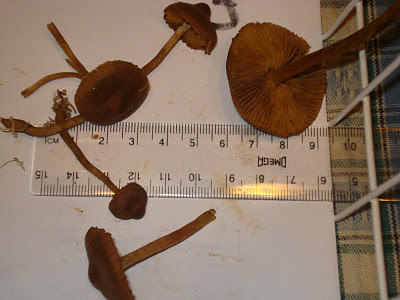(In English below.)
Eftersom det här är en stickblogg kommer jag att ha en vinkling från sticknings sida om mat.
Stickning sker med nån sorts garn. Det finns många olika sorters garn, av många olika material. Ett av mina favoritmaterial, ja det mest älskade, är ull.
Ull kommer från får.
Får går ute i hagar och äter gräs och sly och löv och "allt sånt grönt" som de når. Det gör inget att marken i hagen är så stenig att man inte kan köra ner en plog utan att slå sönder den. Marken producerar ändå. I och med att de håller sly borta så håller de landskapet öppet. De är så nätta att de inte sliter så hårt på marken som större djur. De behöver inte heller lika mycket näring per djur och dag som ett större djur.
Förutom att få ull från får kan man få ost och kött och skinn. Man får alltså både slöjdmaterial och mat.
Angoragetter antar jag inte bara ger en bra ull utan även getost, även om de kanske inte är avlade på just mjölkproduktionsegenskaper.
Alpacka är ett annat djur som ger ull och som sliter måttligt på marken, då de har trampdynor istället för hårda klövar. Men jag vet inte om de ger något ätbart.
På senare år har man hittat på nya material. T ex kan man, håll i er, spinna garn av mjölk! Riktigt hur man behandlar mjölk för att få fibrer av den vet jag inte, men det låter inte så där väldans enkelt.
Det jag reagerar mest på är att man gör slöjdmaterial av mat. Hallå! Det finns folk i världen som väldigt mycket hellre skulle ha mjölk
i sina magar än runt om. Och jag är dessutom övertygad om att de inte ens skulle få mjölken runt just sina magar. Den skulle hamna runt våra.
Man kan även fundera kring bomullsodlingar. Skulle man kunna ha odlat mat där? Tillsammans kan jag tro att det inte fungerar då de flesta bomullsodlingar är hårt besprutade med allehanda ämnen. Det kanske rent av märks i grundvattnet?
Och hur är det med de syntetiska materialen? Stör de matproduktionen?
In English:This is a blog about knitting, so I will look at the issue food from that angle.
When you knit you use some sort of yarn. There are different kinds of yarn, of different materials.One of my favorites is wool, well, the most preferred. Wool grows on sheep. Sheep graze outdoors: grass, brushwood, leaves and "anything green" they can get to. A lot of stone in the ground so you can't plough is no problem, the land produces anway.
Brushwood away means a nice pastorale landscape. That is nice and very popular, at least in Sweden. They are so dainty so they make almost no harm to the ground, compared to heavier animals. Also, they don't need that amount of food per head and day.
In addition to wool, you can get cheese, meat and leather from the sheep. So you get both craft material and food.
Mohair goat, I guess, produce cheese besides nice "wool", even though you don't breed for the milk amount.
Alpacka produces wool and they have pads instead of cloven hooves. So they also walk without harming the ground. But I don't know if you eat them.
In recent years new materials are invented. For example there is yarn spun of milk! I'm not sure how you treat the milk to get the fibres but I don't think it seems very easy.
I am upset about doing this to high quality food just because you can. There are thousands of people who would like to have the milk
in their bellys instead of wrapped around. (And I am pretty sure the milk yarn item will be wrapped someone else anyway.)
One can also think about cotton fields. Should it be possible to grow food there? I think no. The cotton is heavily sprayed and that wouldn't be healthy for the food. Maybe it is also so that chemicals goes from the cotton fields to the ground water?
How about the synthetic fibres? Do they disturb the production of food?











